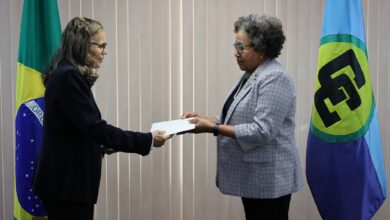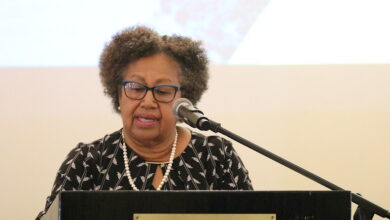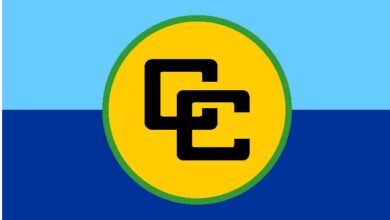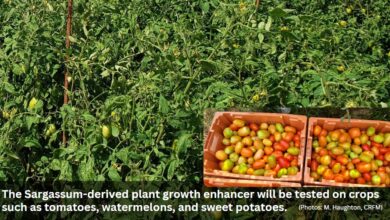CARICOM Secretariat, Turkeyen, Greater Georgetown, Guyana) Your Excellency Alfredo Moreno, Foreign Minister of Chile; Foreign Ministers and Heads of Delegation of CARICOM Member States; Senior officials of Chile and CARICOM States and of the CARICOM Secretariat; Distinguished Guests, Ladies and Gentlemen; Representatives of the Media.
It is a pleasure to be here in Santiago, Chile on the occasion of this, the Second Meeting of the CARICOM-Chile Joint Commission. On behalf of my CARICOM colleagues and Heads of Delegation, I bring warm greetings from the Caribbean to you and your delegation and wish to thank you for the equally warm hospitality we have received since our arrival. I believe that this eagerness to have us feel at home is a shared virtue between our two sides.
Excellency, it has been nine years since we last met for our Inaugural Meeting of the Joint Commission in Chile. Despite that passage of time we do not feel like strangers as our Member States have maintained regular communication with each other. Indeed Chile is one of the countries with an Ambassador accredited to the CARICOM Community. This has ensured the regular communication needed to put our relations on a firm footing.
Even before the formalization of our relations in May 1996 when we signed the Agreement to Establish a Standing Joint Commission on Consultation, Cooperation and Coordination and an Agreement on Scientific and Technical Cooperation, the Member States of CARICOM and Chile enjoyed positive political relations within the context of a number of critical multilateral fora. These include the Organization of American States, the Summit of the Americas process, and of course the United Nations. Since then we have both also been a part of the European Union-Latin American and Caribbean Summits, the Rio Group, the Summit on Integration and Development, and more recently, the Community of Latin America and Caribbean States (CELAC).
The areas in which we have undertaken cooperation since the First Joint Commission held in 2003 are many and varied. They include nutrition; agribusiness; irrigation; diplomatic training; Spanish language training for school teachers; post-graduate scholarships in international relations, international law, education, natural resource management and planning; and international negotiations. These elements of cooperation highlight the value of our relationship. The countries of CARICOM are appreciative of the technical cooperation initiatives undertaken by Chile in our Member States. It is our hope that the dialogue and exchange that will emanate from this Joint Commission will deepen and widen our cooperation in these areas as well as new ones. I am certain that this Joint meeting will serve to strengthen our political and economic ties.
At a time of great global economic and financial uncertainty, our people are concerned that our countries grow and develop. In this regard I wish to point out that CARICOM Member States are at a very delicate stage of their development. Several of them have been severely affected by the global economic and financial crisis. That is why they have been seeking to garner international solidarity and support for the Highly Indebted Middle-Income Countries (HIMICs) who have been severely constrained by their inability to finance their economic development. We hope to count on Chile’s support in making the case to International Financial Institutions (IFIs).
In this context of the concerns of our beloved people we are moved to advance some strategic areas of cooperation with Chile. In all these areas Chile has experience, competence and the capacity and capability to assist us. I speak to such areas such as:
• Trade and Investment;
• Tourism;
• Technical Assistance in the teaching of Spanish from primary to tertiary levels, curriculum design, learning aids, and teacher training. Of course capacity building assistance is needed in a range of other areas including natural disaster preparedness and response, diplomacy, and trade negotiations, attracting foreign direct investments and the development of small and medium sized enterprises;
• Cooperation in Agriculture to promote Food Security and nutrition focusing on production, post harvest and distribution; and
• Contributions to some of our regional institutions such as the CARICOM Development Fund, the Caribbean Health and Food Safety Agency and the Caribbean Development Bank can make significant difference on our journey of growth and development.
It is important that as part of the way forward we should not only agree on the areas of cooperation but should also identify the mechanism and road map which will ensure the timely implementation of the decisions and agreements for future collaboration emanating from this Meeting. Time is of essence.
Excellency, never has South-South Cooperation – on both the political and economic fronts- taken centre stage as it has in this era. We are witnesses to monumental and systemic global shifts in power and influence that see Latin America and the Caribbean, and a number of developing countries coming into their own. It is up to us to fully exploit the possibilities opening up to us to make the shared development aspirations of our people tangible.
In this regard CELAC is emerging as an important supporting body for stronger links, deeper dialogue and more strategic convergences of positions, especially in international fora. Our discussions on preparations for the EU-CELAC Summit, economic issues of mutual interest and enhanced cooperation will give us the opportunity to advance the process of concrete cooperation towards tangible development. It will form the framework for inter-cultural exchanges, the deepening of trade relations and set the tone for further collaboration in the hemispheric and international fora.
We in CARICOM are of the firm view that together we can make a difference, not only in our own regional destinies but in the global development trajectory. And it is imperative that we make a difference as we are, like many small and vulnerable economies, confronted with serious, and some might say unprecedented challenges.
Among the common challenges that we share with Chile are Climate Change and its concomitant risks, including increased and intensified natural disasters, the global financial and economic crises and increasing human insecurity. But if Chile and CARICOM are all too familiar with development threats we are also only too conscious of how our joint action can attenuate challenges. Chile’s support to Haiti following the latter’s cataclysmic earthquakes in 2010 remains a vivid example to CARICOM of Chilean solidarity with our people. We want once more to say thank you.
I say all this Ministers to illustrate the observation with which I began – that the possibilities for mutual advancement and strengthened ties abound in our relationship. I trust that in the course of and follow-up to this Joint Commission, we will ensure that this truth becomes evident to our Peoples.
I thank you.
Santiago, Chile 3 February 2012






